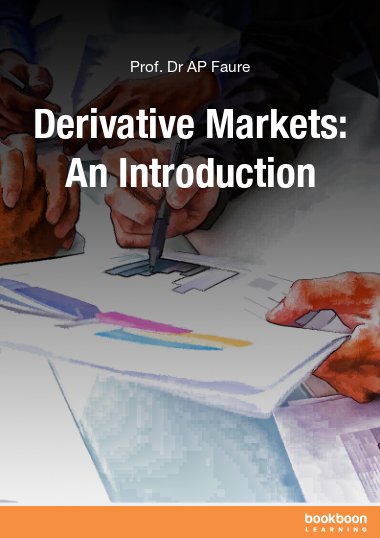Forwards, futures, swaps, options, hybrids (such as swaptions and options on futures) and a category “other” (credit derivatives, weather derivatives, etc) make up the derivative markets. The word is drawn from “derive” and means that the derivative instrument cannot exist on its own. It is closely related to “something” and this something is usually a spot (or “cash”) market instrument called the underlying instrument. A spot deal is a deal done now (T+0 days) for settlement now. “Now” means the earliest date dictated by market convention. For example, in the money market a Treasury bill sale transacted on T+0 can be settled today (T+0) or tomorrow (T+1). In the bond market deals are done on T+0 and usually settled on T+3. In spot deals and derivative deals the price is agreed on T+0, but settlement dates are different: spot deals are settled “now” and derivative in the future (eg. T+180). Derivatives are used for hedging, speculation and investment.

Description
Content
Reviews
- Context
- Learning outcomes
- Introduction
- The financial system in brief
- Ultimate lenders and borrowers
- Financial intermediaries
- Financial instruments
- Spot financial markets
- Interest rates
- The derivative markets
- Summary
- Bibliography
- Derivative markets: forwards
- Learning outcomes
- Introduction
- Spot market: defintion
- Forward market: defintion
- An example
- Forward markets
- Forwards in the debt markets
- Forwards in the share / equity market
- Forwards in the foreign exchange market
- Forwards in the commodities market
- Forwards on derivatives
- Organisational structure of forward markets
- Summary
- Bibliography
- Derivative markets: futures
- Learning outcomes
- Introduction
- Futures defined
- An example
- Futures trading price versus spot price
- Types of futures contracts
- Organisational structure of futures markets
- Clearing house
- Margining and marking to market
- Open interest
- Cash settlement versus physical settlement
- Payoff with futures (risk profile)
- Pricing of futures (fair value versus trading price)
- Fair value pricing of specific futures
- Basis
- Participants in the futures market
- Hedging with futures
- Basis trading
- Spread trading
- Futures market contracts
- Risk management by a futures exchange
- Economic significance of futures markets
- Summary
- Bibliography
- Derivative markets: swaps
- Learning outcomes
- Introduction
- Interest rate swaps
- Currency swaps
- Equity / share swaps
- Commodity swaps
- Listed swaps
- Organisational structure of swap market
- Summary
- Bibliography
- Derivative markets: options
- Learning outcomes
- Introduction
- The basics of options
- Intrinsic value and time value
- Option valuation/pricing
- Organisational structure of option markets
- Options on derivatives: futures
- Options on derivatives: swaps
- Options on debt market instruments
- Options on equity / share market instruments
- Options on foreign exchange
- Options on commodities
- Option strategies
- Exotic options
- Summary
- Bibliography
- Other derivatives
- Learning outcomes
- Introduction
- Securitisation
- Credit derivatives
- Weather derivatives
- Carbon credit derivatives
- Freight (or shipping) derivatives
- Energy derivatives
- Summary
- Bibliography
- Endnotes
The book simplifies some of the most technical and complicated instruments into understandable language. Thank you Dr Faure.
